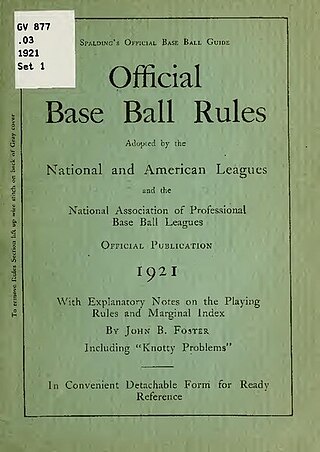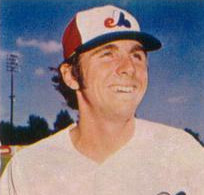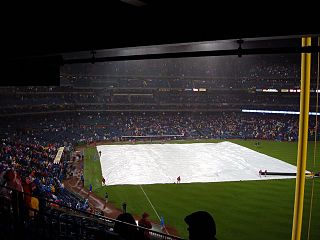Related Research Articles
A mercy rule, slaughter rule, knockout rule, or skunk rule ends a two-competitor sports competition earlier than the scheduled endpoint if one competitor has a very large and presumably insurmountable scoring lead over the other. It is called the mercy rule because it spares further humiliation for the loser. It is common in youth sports in North America, where running up the score is considered unsporting. It is especially common in baseball and softball in which there is no game clock and a dominant team could in theory continue an inning endlessly.

In baseball, a no-hitter is a game in which a team was not able to record a hit. Major League Baseball (MLB) officially defines a no-hitter as a completed game in which a team that batted in at least nine complete innings recorded no hits. A pitcher who prevents the opposing team from achieving a hit is said to have "thrown a no-hitter". In most cases, no-hitters are recorded by a single pitcher who throws a complete game; one thrown by two or more pitchers is a combined no-hitter.
A draw or tie occurs in a competitive sport when the results are identical or inconclusive. Ties or draws are possible in some, but not all, sports and games. Such an outcome, sometimes referred to as deadlock, can also occur in other areas of life such as politics, business, and wherever there are different factions regarding an issue.

Extra innings is the extension of a baseball or softball game in order to break a tie.

Throughout the history of baseball the rules have frequently changed as the game has continued to evolve. The rules of baseball can vary slightly from league to league, with there being dozens of leagues worldwide. A few common rules most professional leagues have in common is that 4 balls is a Base on balls, 3 strikes is a strikeout and 3 outs ends a half inning. One example of differing rules in professional leagues is in Major League Baseball a pitch clock is in place to speed up the pace of the game by forcing pitchers to pitch in a 15-20 second window, where in the Nippon Professional Baseball League no such rule exists.
In rare cases, baseball games are forfeited, usually when a team is no longer able to play. Although not uncommon in baseball's early days, forfeits are now rare. There have been only five forfeits in Major League Baseball (MLB) since 1954; the last forfeit was in 1995, and prior to that, 1979. Since 1914, there has only been one incident where a team deliberately made a decision to forfeit a game, by the 1977 Baltimore Orioles.

A scoreboard is a large board for publicly displaying the score in a game. Most levels of sport from high school and above use at least one scoreboard for keeping score, measuring time, and displaying statistics. Scoreboards in the past used a mechanical clock and numeral cards to display the score. When a point was made, a person would put the appropriate digits on a hook. Most modern scoreboards use electromechanical or electronic means of displaying the score. In these, digits are often composed of large dot-matrix or seven-segment displays made of incandescent bulbs, light-emitting diodes, or electromechanical flip segments. An official or neutral person will operate the scoreboard, using a control panel.

The 2005 American League Championship Series (ALCS), the second round of the 2005 American League playoffs, which determined the 2005 American League champion, matched the Central Division champion Chicago White Sox against the West Division champion Los Angeles Angels of Anaheim. The White Sox, by virtue of having the best record in the AL during the 2005 season, had the home-field advantage. The White Sox won the series four games to one to become the American League champions, and faced the Houston Astros in the 2005 World Series, in which the White Sox swept the Astros in four games to win their first World Series championship in 88 years; as a result of the 2005 All-Star Game played in Detroit, Michigan at Comerica Park on July 12, the White Sox had home-field advantage in the World Series. The series was notable both for a controversial call in Game 2 of the series, and the outstanding pitching and durability of Chicago's starting rotation, pitching four consecutive complete games; the +2⁄3 of an inning Neal Cotts pitched in the first game was the only work the White Sox bullpen saw the entire series.

Stephen Douglas Rogers is a former starting pitcher in Major League Baseball who played his entire career for the Montreal Expos. He batted and threw right-handed.
Rainout, washout, rain delay, and rain stopped play are terms regarding an outdoor event, generally a sporting event, delayed or canceled due to rain, or the threat of rain. It is not to be confused with a type of out in baseball, though a baseball game can be rained out. Delays due to other forms of weather are named "snow delay", "lightning delay", "thunderstorm delay", or "fog delay", while there are many other effects of weather on sport. Also, a night game can be delayed if the floodlight system fails. Often spectators will be issued a ticket for a make up event, known as a "rain check".

In the sport of baseball, a doubleheader is a set of two games played between the same two teams on the same day. Historically, doubleheaders have been played in immediate succession, in front of the same crowd. Contemporarily, the term is also used to refer to two games played between two teams in a single day in front of different crowds and not in immediate succession.

In baseball, softball, and similar games, an inning is the basic unit of play, consisting of two halves or frames, the "top" and the "bottom". In each half, one team bats until three outs are made, with the other team playing defense. A full baseball game is typically scheduled for nine innings, while softball games consist of seven innings; although this may be shortened due to weather or extended if the score is tied at the end of the scheduled innings. The use of the term inning in baseball and softball contrasts with cricket and rounders, in which the term is innings in both singular and plural.

A suspended game in baseball occurs when a game has to be stopped before it can be completed, and the game is meant to be finished at a later time or date. Suspended games are used in Major League Baseball, Minor League Baseball, and may also be used at other levels of play depending on league or tournament rules.

The 2008 World Series was the championship series of Major League Baseball's (MLB) 2008 season. The 104th edition of the World Series, it was a best-of-seven playoff between the National League (NL) champion Philadelphia Phillies and the American League (AL) champion Tampa Bay Rays; the Phillies won the series, four games to one. The 2008 World Series is notable because it is the only World Series to involve a mid-game postponement and resumption.
The 1980 National League West tie-breaker game was a one-game extension to Major League Baseball's (MLB) 1980 regular season, played between the Houston Astros and Los Angeles Dodgers to decide the winner of the National League's (NL) West Division. The game was played on October 6, 1980, at Dodger Stadium in Los Angeles, California. It was necessary after the Dodgers overcame a three-game deficit in the final three games of the season and both teams finished with identical win–loss records of 92–70. The Dodgers won a coin flip late in the season which, by rule at the time, awarded them home field for the game.

In Major League Baseball, a shutout refers to the act by which a single pitcher pitches a complete game and does not allow the opposing team to score a run. If two or more pitchers combine to complete this act, no pitcher is awarded a shutout, although the team itself can be said to have "shut out" the opposing team.
The 2010–11 Australian Baseball League season was the inaugural Australian Baseball League (ABL) season, and was held from 6 November 2010 to 13 February 2011. It came 12 years after the old Australian Baseball League ceased and is the successor of the mostly amateur Claxton Shield competition that has been played since 1934. The season consisted of six teams competing in a 40-game schedule, followed by a three-round finals series to determine the ABL champion.
The 2019–20 Australian Baseball League season was the tenth year Australian Baseball League (ABL) season. The season was held from 21 November 2019 to 9 February 2020. The Melbourne Aces won their first title after defeating the Adelaide Giants in the postseason.

The 2021 National League Division Series were two best-of-five-games series in Major League Baseball (MLB) to determine the participating teams of the 2021 National League Championship Series. The three divisional winners, seeded first through third, and a fourth team — determined by the NL Wild Card Game — played in two series. These matchups were:
References
- ↑ "Official Rules: 4.00 Starting and Ending a Game". Major League Baseball. pp. Rule 4.12. Retrieved 9 October 2011.